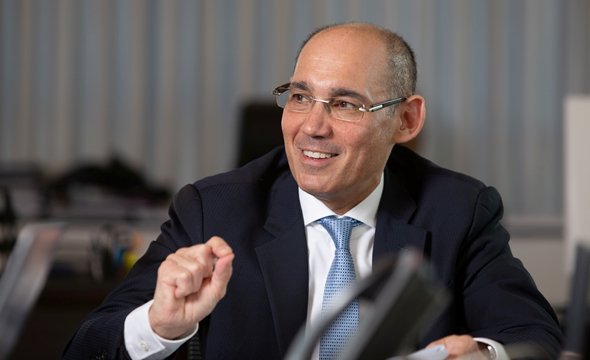Bank of Israel chief says it's ready to buy more than $30 billion of foreign currency to contain shekel’s strength
The shekel gained some 8% against the dollar in 2019, and another 8% last year despite central bank foreign currency purchases of $21 billion
The Bank of Israel could buy more than $30 billion of foreign currency this year if necessary to contain the shekel’s strength, Governor Amir Yaron said.
Yaron made the comments at a closed event on Sunday night. The remarks were issued by the central bank on Monday.
 Bank of Israel Governor Amir Yaron. Photo: Alex Kolomoisky
Bank of Israel Governor Amir Yaron. Photo: Alex Kolomoisky Last month, the Bank of Israel said it planned to buy $30 billion of foreign currency this year after the shekel appreciated sharply to a 24-year peak against the dollar, making it one of the world’s strongest currencies. Officials at the time said it was to give the market certainty of its intentions while also helping to protect exporters.
Yaron said the amount was considerable.
“To understand the magnitude, consider what would happen in the foreign exchange market if the surplus in the current account would decrease by such an amount,” he said.
- Top tech CEOs demand Israeli government stop dollar depreciation against the shekel
- Israeli tech sector raises alarm bells over plummeting dollar
- Too much of a good thing? The rising shekel puts Israeli tech companies at risk
The shekel gained some 8% against the dollar in 2019, and another 8% last year despite central bank foreign currency purchases of $21 billion.
“Clearly, if it will be relevant, and given the economic and market conditions at the time, we will be able to increase the scope of the foreign exchange purchase program, just like when we announced, previously, the expansion of the government-bond quantitative easing plan,” Yaron said.
Last year, the Bank of Israel initially had announced a plan to buy 50 billion shekels ($15 billion) of government bonds but later boosted that to 85 billion shekels.
For now, the intervention plan has worked. The shekel has slipped 5% to 3.28 per dollar since the Bank of Israel announcement on Jan. 14, with analysts believing speculative flows have been mostly scared away.
The central bank said on Sunday it bought more than $6.8 billion of foreign currency in January.
Policymakers have attributed the shekel’s strength to the weak dollar, a widening current account surplus stemming from robust technology exports and lower imports last year amid the pandemic, large foreign direct investment into Israeli high-tech firms, and higher foreign flows into Israeli government bonds.
Yet more upwards pressure on the currency comes from hopes for a healthy domestic recovery thanks to a rapid Covid-19 vaccination rollout and more investment stemming from normalisation deals with Arab countries.



